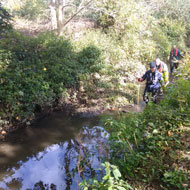
Pollutants dumped in the Thames due to misconnected plumbing
Nearly a third of London’s outfalls show signs of contamination, meaning raw sewage and other pollutants are ending up in the Thames, putting wildlife at risk. This is according to a comprehensive survey led by the Zoological Society of London (ZSL).
Teams of volunteers surveyed river banks, using an app to geotag, photograph and assess outfalls - drains that send surface water to rivers - for evidence of pollution.
ZSL said there were signs of contamination, including sewage fungus, in 356 of the 1,177 surveyed locations. In addition, 269 locations had definite pollution problems. This equates to an average of two to three polluting outfalls for every kilometre of river surveyed.
The data suggests a large number of homes and businesses across London are sending waste from toilets, sinks and washing machines into rivers, due to misconnected plumbing. ZSL said pollution is degrading the ecological health of rivers, limiting the amount of wildlife they can support.
“Approximately 600km of rivers and streams flow through Greater London into the tidal Thames,” explained Joe Pecorelli, project manager of ZSL’s estuaries and freshwater team.
“Together, these waterways represent an invaluable habitat for wildlife, from eels and water voles, to kingfishers and dragonflies – but a history of poor water quality, badly-designed flood defences and adaptations for navigation has prevented many of them from achieving their full ecological potential.”
ZSL is calling for a “significant increase” in investment to address the misconnections in London’s plumbing systems. Home and business owners across the capital are also being urged to have their plumbing checked for misconnections.
Debbie Leach, chief executive of London’s waterways charity Thames21, added: “There is a massive environmental accident happening across London, and it is devastating our rivers. But because it is happening day after day, it isn't making the news. That has to change.”
Image courtesy of ZSL



 The latest
The latest